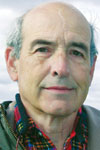 Look
What's Coming
Look
What's Coming
by Wayne Myers, M.D.
The Price of Privacy
When I was a working doc I had no special concerns or insights
regarding medical privacy. I tried to go by the rules and the spirit
thereof, remember the Hippocratic oath, and that was that. Of late I
am less certain that the value we attach to the privacy of medical
records is justified. Iím becoming convinced that excessive concern
about medical privacy is killing people. I doubt that medical privacy
is worth dying for.
I am talking only about concerns that the wrong people might get
access to medical records. I am not talking about the constitutional
right to privacy or any other more weighty aspects of the concept. Nor
am I going into the procedures mandated by recent changes in federal
law. Iím sticking to the big picture. Should we be so very concerned
about medical snoops?
The outline of my argument is as follows. Timely and reliable
access to a personís medical records can determine the personís health
or even survival. That access is tenuous for most of us. Concerns
about medical privacy impede the development of regional or national
medical information systems. Such information systems could support
error detection, inform reliable care regardless of time or place, and
accelerate treatment research. The interests most likely to use
personal medical information against an individual are his/her
insurance company and the employer who pays for some health insurance.
They already get the information.
The lack of personal medical information is dangerous, as business
travelers, vacationers and people involved in this summerís hurricane
evacuations have discovered. The situation is a little better but
still problematic for people hitting the emergency room, conscious or
not, after clinic hours.
Iíve never seen estimates of the number of deaths attributable to
lack of medical records. Two separate studies have estimated the
number of deaths due to hospital errors at 44,000 and 94,000 per year.
My guess, based on years in various kinds of practice, would put the
number of deaths attributable to lack of records a bit lower, i.e. a
few tens of thousands per year. The number of people wearing medical
alert bracelets suggests widespread concern with this problem. Test
results and reports are often lost or delayed. The amount of time and
money spent repeating studies is astronomic.
Is there a rural slant to this? Rural people are more likely to
leave their home communities for a variety of reasons than urban
folkówork, shopping, tertiary care. Wouldnít it be nice if a personís
health records were readily accessible regardless of time or place?
Health care quality experts point out that mistakes are inevitable.
Reducing damage due to mistakes requires several changes in the way we
do health care. One such change is the development of digital record
keeping which supports error detection. They also point out the value
of automated registries. What percentage of our diabetics is getting
their feet examined, eyes checked, sugars well controlled? These sorts
of registry functions require digital records of the sort compatible
with automated access.
The Indian Health Service has had a nationally accessible patient
record system for decades. The Department of Veterans Affairs system
is attracting lots of favorable attention.
Progress is being made. The developing pattern is based on Regional
Health Information Organizations, or RHIOs. There are about 400 such
RHIOs in various stages of development. Federal involvement is being
managed by the Office of the National Coordinator of Health
Information Technology (ONCHIT). If youíd like to know more go to
http://www.dhhs.gov/healthit/.
As you might expect, itís a pretty good web site.
Wayne Myers, a pediatrician, founded the University of Kentucky
Center for Rural Health and served as its director. He also served as
director of the Office of Rural Health Policy in the Department of
Health and Human Services' Health Resources and Services
Administration. He is a past president of the National Rural Health
Association and currently serves on its Board of Trustees.